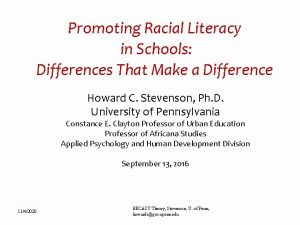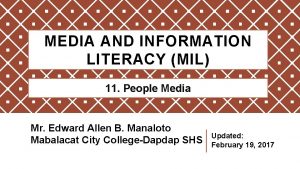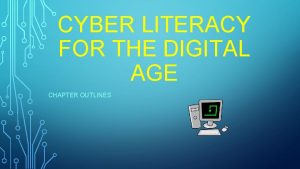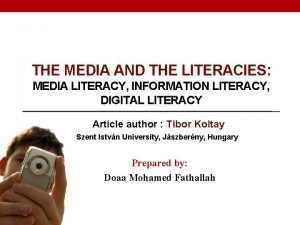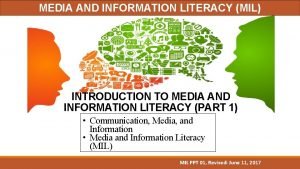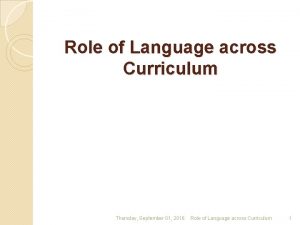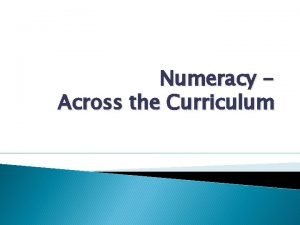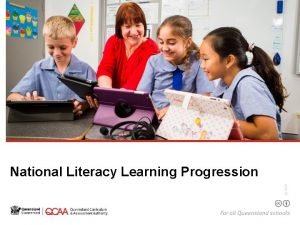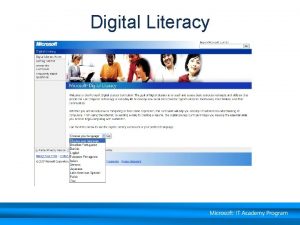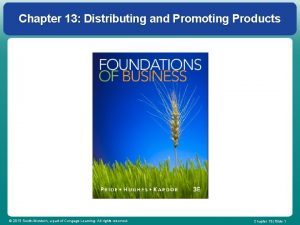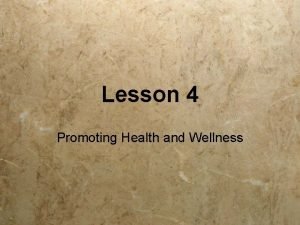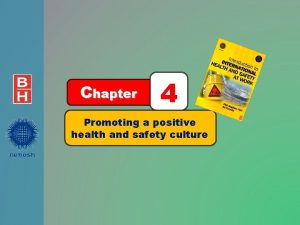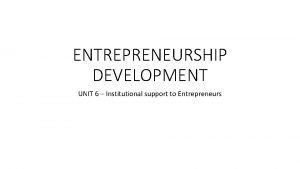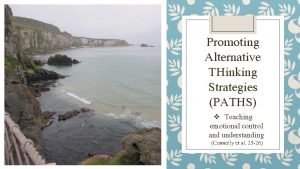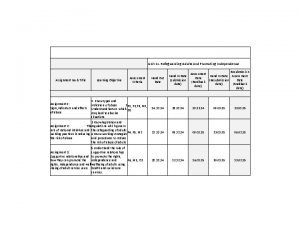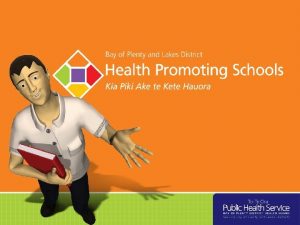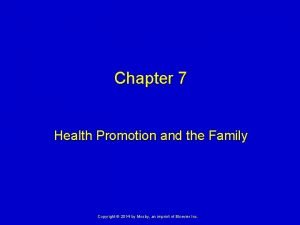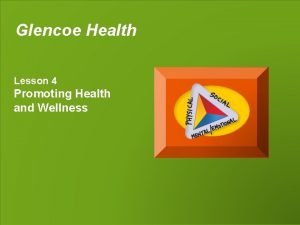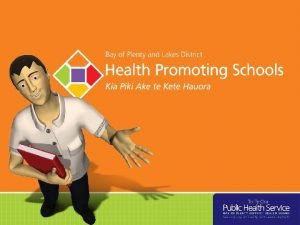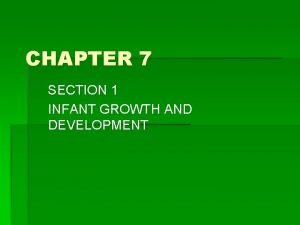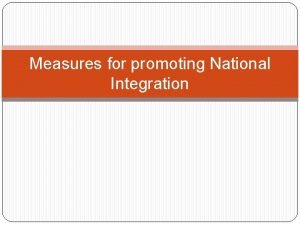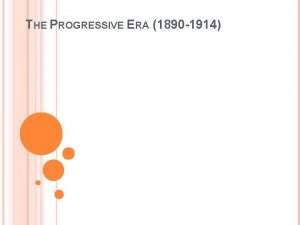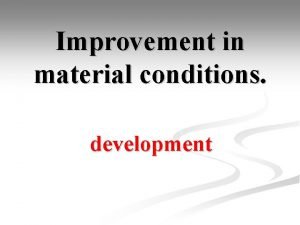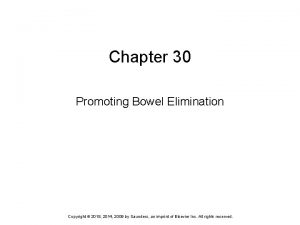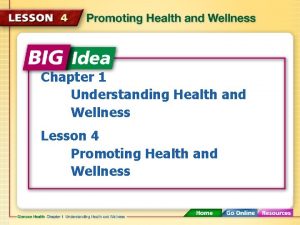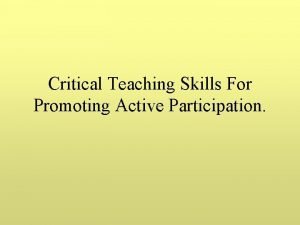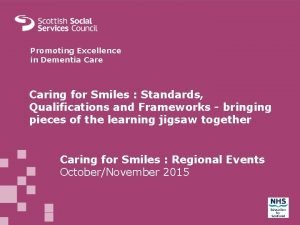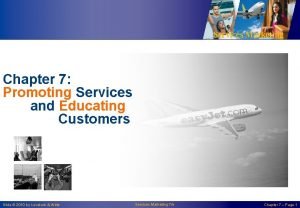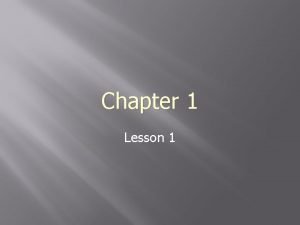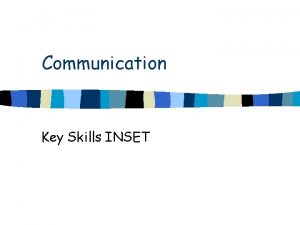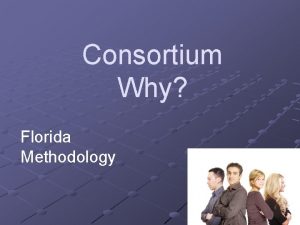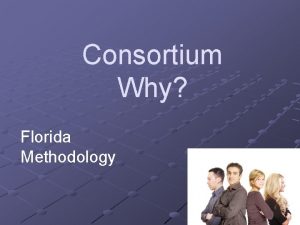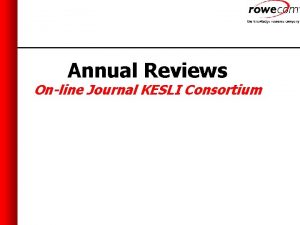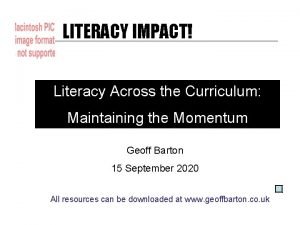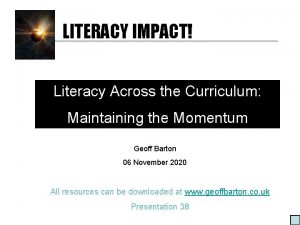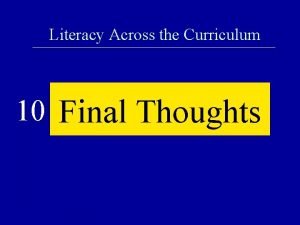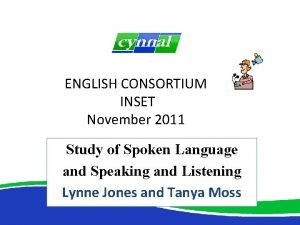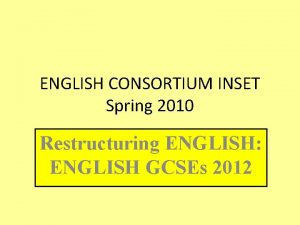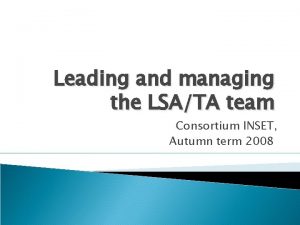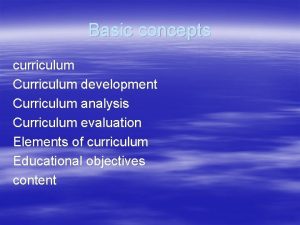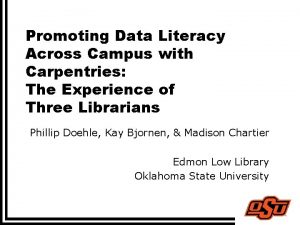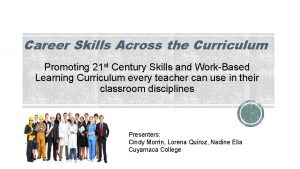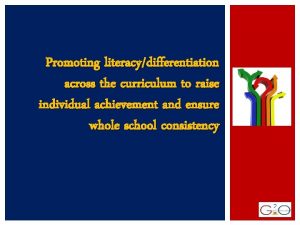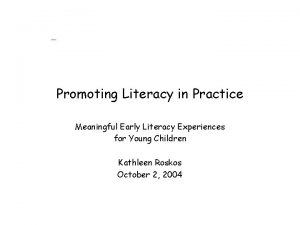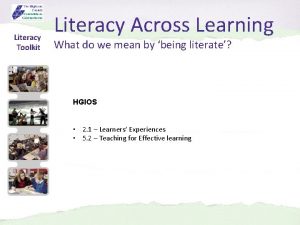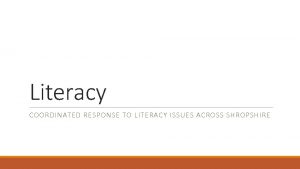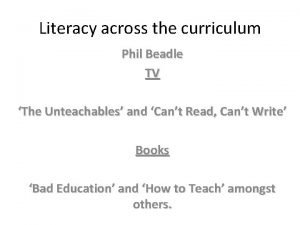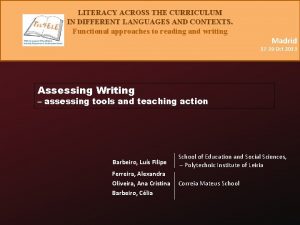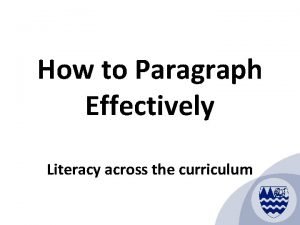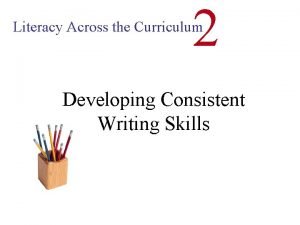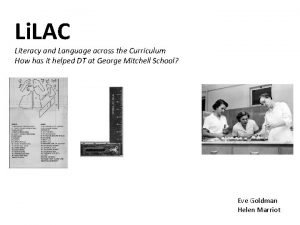Promoting literacy across the curriculum Consortium INSET Autumn


















































- Slides: 50

Promoting literacy across the curriculum Consortium INSET : Autumn 2011

1. Background • CBI report 2011 • National and international assessment : PISA/ GCSE results • Estyn inspection evidence

“Good literacy skills underpin effective learning for all learners, whatever they are studying. These skills support effective communication, and equip learners for achievement and success within education, life in the wider community and the world of work. ” (Developing higher-order literacy skills across the curriculum)

Focus on developing literacy in Wales Ø Subject orders 2008 Ø Skills Framework – communication ØCommon Inspection Framework – Estyn 2010 (1. 1. 4 and 2. 1. 2) ØSchool Effectiveness Framework ØBasic Skills Wales: Communication, Numeracy, ICT ØEssential Skills Wales (ESW): Communication, ICT, Application of Number ØDCELLS / Welsh Assembly Government ØWelsh Medium Education Strategy ØLanguage, Communication and Literacy Strategy (Cynnal) ØLanguage for Thinking and Learning (Cynnal) ØWelsh Education Plan

Training materials (DCELLS): Higher-order reading Writing Higher literacy KS 3 - KS 4

Developing Learners’ literacy : integral part of teaching and learning • This is relevant to all teachers in secondary schools, whatever their subject specialism, since all teachers need to be teachers of literacy skills. • Learners’ achievement and enjoyment of all subjects are likely to be enhanced if they are confident and competent in their literacy skills. • Teachers of all subjects should use a range of tasks and contexts that allow learners to develop their literacy skills in a meaningful way. • This might include research work, c onsidering the ideas of others, and recording learners’ own ideas and conclusions. (Developing higher-order literacy skills across the curriculum)

Language for Thinking and learning: learning Guidance for oracy, reading and writing across the curriculum

It is the responsability of every teacher to develop learners’ communication skills by planning appropriate activities in the three language skills: oracy, reading and writing

2. Estyn’ focus on literacy.






Estyn : strategy and guidance for inspecting literacy

What? 1. Standards : Gathering evidence and making judgements about pupils’ literacy skills 1. 1. 4 2. Provision : Gathering evidence and making judgements about provision for literacy 2. 1. 2

How ? Gathering evidence and making judgements about pupils’ literacy skills 1. 1. 4 • Data: English/Welsh compared with family and FSM benchmarks /reading age scores/ Essential Skills Wales qualifications in Communication • Sample of work: to evaluate how well pupils apply their reading skills • Lesson observation

How? Gathering evidence and making judgements about provision for literacy 1. 2. 3. 4. 5. 6. 7. 8. Policies Samples of schemes of work Samples of short term planning, such as lesson plans Teaching of literacy: lesson observation Pupils’ work Classroom display/ resources Interviewing middle managers Interviewing learners

Estyn Evidence forms For: • Book scrutiny • Lesson observation • Teaching

Estyn’ s questions When interviewing: Ø middle managers. Ø learners See in summary booklet of Estyn’s strategy and guidance

3. Developing literacy in MFL

What does Literacy mean to you as MFL teacher / language teacher ? Discuss

1. ORACY Why is it important to develop learners’ speaking and listening skills ? ØDiscuss in pairs

What are all teachers expected to do in their subjects? • • • • Include oracy as a natural part of every lesson Ensure that oracy forms a natural part of developing assessment for learning and of developing thinking and learning skills Create a suitable climate for oral work in class Provide regular opportunities to develop oral work Plan oral work carefully Incorporate various and suitable oral activities into schemes of work and lessons Provide purposeful and relevant stimuli in order to elicit extended oral responses Provide opportunities for learners to work in pairs and groups and promote their ability to do so effectively (see further guidance) Provide appropriate support for individuals and groups – frequent and constructive feedback on how to improve Identify oral success criteria for learning and thinking Ask open questions which will encourage learners to think and respond extendedly Ensure opportunities for learners to reflect in order to assess their own oral skills and those of their peers Provide encouragement and support - model vocabulary and relevant language patterns


Teaching and Learning methods • Pair work • Group work Effective group work? Implication on use of the target language? ü Use of “table mats” with useful phrases to encourage use of the target language. • Activities suitable for the MFL lesson?

Teaching and Learning methods Task: • Work in groups of 4. • Complete the task • Reflect on effectiveness of group work

2. READING Why is developing reading important? ØDiscuss in pairs

What are all teachers expected to do in their subjects? • Provide frequent opportunities to develop reading according to the subject requirements • Contribute to a ‘reading school’ climate: reading as a stimulus, wall displays, relevant and suitable materials, subject vocabulary… • Plan carefully for reading: purpose; appropriate reading materials for learners’ reading skills; appropriate reading strategies (see further guidance) • Help learners to acquire a range of strategies for gathering information including multimedia texts • Identify opportunities for joint reading e. g. pair, group reading, when doing various activities.

Reading strategies • • • Scanning Skimming Close reading Sequencing activities Predicting Task : In pairs , match strategies to definitions

Reading strategies DARTS = Directed Activities Related to Texts 2 types of activities: reconstruction activities using a modified text analysis activities using straight text

Close reading in MFL • Re-read to find context clues to help with unfamiliar words • Re-read for specific detail – to identify main points by underlying, highlighting, noting key words or phrases, noting 4 or 5 key points – to record key points or specific detail by completing a chart or a grid. • To recognise generic structure through language , e. g. first, next, then, after, however… • To look at how paragraphs are used to organise and sequence text.


Tools for reading • Task : In pairs Ø How can each tool help reading ? Ø Match tool and explanation

Using Thinking Tools to Support Pupils ’ Reading

Shared Reading • Teacher demonstrates the process of reading and making sense of the text. • There is a particular focus on aspects of the text which relates to the lesson’s objectives. • Teacher uses a range of techniques to engage the class actively in the process of reading • The process helps: Ø reading for meaning Ø interrogate text • Provides a setting for cooperative learning : developing motivation and enjoyment in reading

Exemple “Les films à ne pas rater ” • Look at text • Read the lesson plan. Which strategies are used?

Task: • In pairs / groups of 3 : Come up with two or three ways of exploiting this test , to support literacy across the curriculum. • Take into consideration : Øuse/ development of appropriate reading strategies to extract particular information / for a specific objective. Ø use of suitable tool to support reading

3. WRITING Why is developing writing important? ØDiscuss in pairs

What are all teachers expected to do in their subjects? • • • ensure appropriate opportunities to write according to the subject requirements plan carefully for writing by taking account of purpose, audience and form ensure opportunities to develop writing including opportunities to discuss and write collaboratively (see further guidance on the writing process) help learners to identify suitable criteria provide encouragement and support – modelling relevant vocabulary and patterns ensure access to a range of support resources e. g. dictionaries/thesaurus, subjectspecific vocabulary, planning frameworks, appropriate models ensure opportunities for learners to reflect in order to assess their own writing skills and those of their peers provide frequent and constructive feedback on how to improve assess and mark appropriately following the school’s/department’s assessment policy respond to the requirements of the subject specifications (curriculum and examination)

The 6 types of texts Text Type: Instruct Explain Recount Persuade Report Discuss Which types are you the most likely to use in MFL?

Posteri Sgiliau Sylfaenol

Task 1 : In pairs/ small groups Choose 1 type of text per pair/ group Discuss possible tasks at KS 3, KS 4, KS 5 Share with the group. INSTRUCT: DISCUSS EXPLAIN : Possible tasks in MFL RECOUNT : REPORT : PERSUADE :

The 6 types of texts Use of connectives Task : In pairs , organise connectives per type of text


The Writing Process: tools for writing Which tools have you: Ø already used? Ø never used? Which tools could you use ? ØWho with? ØTo support which type of task?

Planning a written task to support the development of literacy 1. Establish clear aims and purpose of the task (audience / type of text) 2. Provide examples of the type of text 3. Explore features of the texts: key learning points identified 4. Planning: Organisation of ideas/ Reference to prior knowledge /Reference materials /Presentation - possible tools to use? 5. Success criteria: How? Who? Tools to note them down ? 6. Development : Steps to take ? Activities? Strategies? Tools? 7. Evaluation of work using agreed success criteria: strategies? 8. Metacognition: Reflecting on learning processes. When ? How?

4. Departmental self- evaluation. Focus on literacy See booklet Cynnal

Next steps ? Discuss , in your department. 1. Provision for literacy? evidence? • Use traffic light evaluation sheets for Oracy, Reading, Writing? • Looking at learners’ work? Sample? Aspect to evaluate? • Evaluation of tools and strategies embedded in the teaching in learning? Sow? Lesson plan? • Lesson observation? • Other?

Next steps? 2. Standards of literacy skills (1. 1. 4)? evidence? • Learners work? All learners? • Progress? • Use of criteria in booklet? • Lesson observations? • Data analysis? Ø KS 3, KS 4, KS 5 Ø Different groups of learners: boys/ girls; SEN; G and T…)
 Inset piece funeral
Inset piece funeral Promoting racial literacy in schools
Promoting racial literacy in schools What are the four types of people as media?
What are the four types of people as media? Cyber literacy for the digital age
Cyber literacy for the digital age Media literacy vs information literacy
Media literacy vs information literacy Communication media and information venn diagram
Communication media and information venn diagram Role of language across curriculum
Role of language across curriculum Numeracy across the curriculum audit
Numeracy across the curriculum audit Literacy learning progressions
Literacy learning progressions Digital literacy standard curriculum version 4
Digital literacy standard curriculum version 4 Chapter 13 distributing and promoting products
Chapter 13 distributing and promoting products Lesson 4 promoting health and wellness
Lesson 4 promoting health and wellness Promoting a positive health and safety culture
Promoting a positive health and safety culture Institutional support to entrepreneurship
Institutional support to entrepreneurship What is deontological ethics example?
What is deontological ethics example? Promoting alternative thinking strategies
Promoting alternative thinking strategies Promoting services and educating customers
Promoting services and educating customers Leaving cert business philip curry
Leaving cert business philip curry Unit 11 safeguarding adults and promoting independence
Unit 11 safeguarding adults and promoting independence Health promoting school
Health promoting school Chapter 7 promoting health and wellness
Chapter 7 promoting health and wellness Glencoe health and wellness
Glencoe health and wellness Health promoting schools model
Health promoting schools model Promoting infant health section 7-2
Promoting infant health section 7-2 Principles of international understanding
Principles of international understanding When was the progressive era? *
When was the progressive era? * Japan's principal asset for promoting development was
Japan's principal asset for promoting development was Chapter 30 promoting bowel elimination
Chapter 30 promoting bowel elimination Chapter 1 lesson 4 promoting health and wellness
Chapter 1 lesson 4 promoting health and wellness Do. 27 s. 2015 promoting family earthquake preparedness
Do. 27 s. 2015 promoting family earthquake preparedness Promoting active participation
Promoting active participation Promoting excellence in dementia care
Promoting excellence in dementia care Promote service arrange decide
Promote service arrange decide Health and wellness vocabulary
Health and wellness vocabulary Diễn thế sinh thái là
Diễn thế sinh thái là Vẽ hình chiếu vuông góc của vật thể sau
Vẽ hình chiếu vuông góc của vật thể sau Công thức tính thế năng
Công thức tính thế năng Làm thế nào để 102-1=99
Làm thế nào để 102-1=99 Tỉ lệ cơ thể trẻ em
Tỉ lệ cơ thể trẻ em Thế nào là mạng điện lắp đặt kiểu nổi
Thế nào là mạng điện lắp đặt kiểu nổi Lời thề hippocrates
Lời thề hippocrates Vẽ hình chiếu đứng bằng cạnh của vật thể
Vẽ hình chiếu đứng bằng cạnh của vật thể đại từ thay thế
đại từ thay thế Quá trình desamine hóa có thể tạo ra
Quá trình desamine hóa có thể tạo ra Các môn thể thao bắt đầu bằng tiếng bóng
Các môn thể thao bắt đầu bằng tiếng bóng Hát kết hợp bộ gõ cơ thể
Hát kết hợp bộ gõ cơ thể Sự nuôi và dạy con của hổ
Sự nuôi và dạy con của hổ Dạng đột biến một nhiễm là
Dạng đột biến một nhiễm là Thế nào là sự mỏi cơ
Thế nào là sự mỏi cơ độ dài liên kết
độ dài liên kết Voi kéo gỗ như thế nào
Voi kéo gỗ như thế nào

